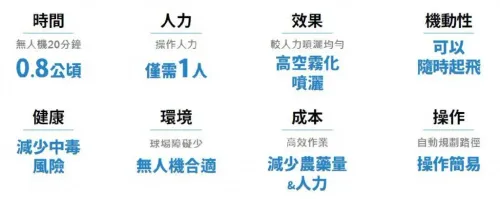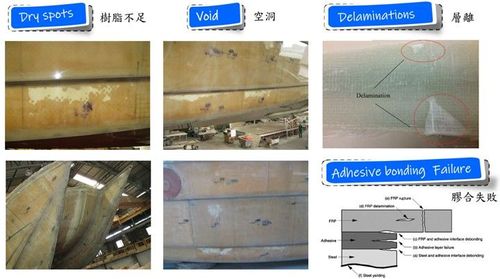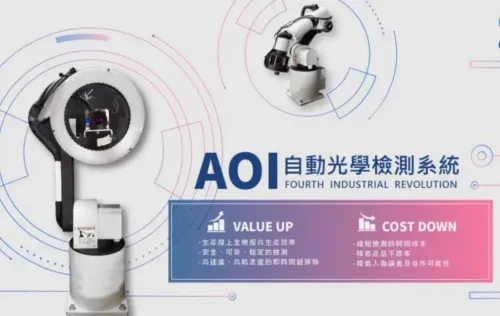【2021 Application Example】 AI Can Make Coffee! Autonomous Coffee Roasters Relying on AI for Precise Location Setting and Cultivating Loyal Customers
Have you had your morning coffee yet?
Over the past decade, Taiwan has gradually formed a coffee drinking culture. With the advancement of AI technology, autonomous coffee roasters can now rely on AI for precise location setting while also cultivating a loyal customer base. Let's see how this is done? According to the International Coffee Organization (ICO), Taiwanese consume approximately 2.85 billion cups of coffee annually, with the coffee market in Taiwan estimated at 80 billion TWD, growing about 20% each year.
In recent years, the 'drinking coffee' culture in Taiwan has become synonymous with popularity, with coffee being the most frequently chosen daily beverage by 65% of the population. Coffee enthusiasts, particularly the more avid ones, are willing to pay more for coffee beans that suit their tastes. An increasing number of unmanned drink kiosks have also begun to appear in the Taiwanese beverage market.
Unmanned coffee beverage shops face difficulties in expanding quickly, primarily due to two major issues: one is the appropriateness of customer flow and machine placement locations which still rely on manual analysis; the second is penetrating the market of mid to high-end coffee lovers accurately.
AI resolves two major challenges for autonomous coffee roasters: suitable placement and cultivating a loyal customer base
To tackle these issues and help autonomous coffee roasters quickly break into the market, Raysharp Electronics intends to implement AI for people flow counting analysis and unfamiliar face recognition. These technologies aim to calculate the crowd size at potential roaster locations and classify consumers by gender and age for more precise market analysis. They also provide multiple choices for the roasting of raw coffee beans, offering a more customized service tailored to the needs and tastes of professional coffee aficionados with a pack of 'high-quality roasted beans'.
Since 2018, the rise of unmanned stores has been mainly due to owners wanting to reduce persistently rising rent and personnel costs. However, the initial assessment of store locations still requires hourly labor expenses for manual estimation of customer flow, leading to possible miscalculations of both on-site consumers and passerby traffic. These inaccuracies may prevent precise real-time analysis of customer flow, or even misguided estimations of operational efficacy after a trial run, thus missing the optimal timing for loss-preventing location retraction.
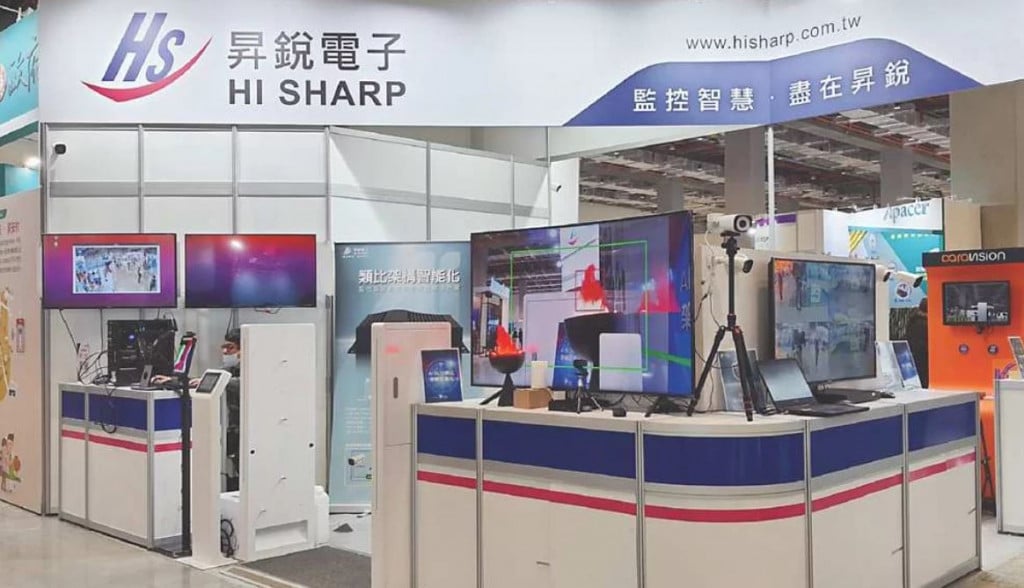
▲ Raysharp Electronics introduces autonomous coffee roasters equipped with AI-based people counting analysis and facial recognition.
Raysharp Electronics combines AI people counting analysis and facial recognition with the coffee trend known as 'black gold', addressing the preferences of numerous coffee connoisseurs in Taiwan who enjoy personally selecting coffee beans at bulk stores and frequenting high-quality grinding cafes or chain coffee shops. A new concept for the first autonomous coffee roaster offering choices based on the origin, variety, and roasting methods of coffee beans has emerged.
AI coffee roasters enhance customer loyalty and materials management efficiency by 20%
For the advanced development of autonomous coffee roasters, Raysharp Electronics engineers have equipped the AI NVIDIA development platform on the basis of TCNN+Facenet. Through AI, tens of thousands of images related to gender and age are used for sample training, allowing even first-time coffee roasting customers to be easily classified using unfamiliar face recognition. This gains consumer trust, enhances willingness to use, and allows for recording purchase information and future product recommendations, leading to consumer purchase behavior analysis. This information helps owners tailor future material preparation based on consumer preferences for different coffee beans, reducing raw material transportation and storage issues, and improving material management efficiency by 20%.
Moreover, by placing these autonomous coffee roasters in high-traffic areas, owners can use cameras to capture the crowd and assess whether the machine location has an adequate customer base, quickly analyzing whether to reposition the machines, and more easily targeting the best locations for middle and high-end coffee lovers.
The unmanned coffee roaster features a professional roasting mode interface, providing options based on the origin and variety of coffee beans, their roasting methods (light, medium, deep), and related temperature, wind speed, and timing settings. If improvement needs arise during the process, engineers can adjust firmware parameters and also assist in integration with the owner's ordering system.
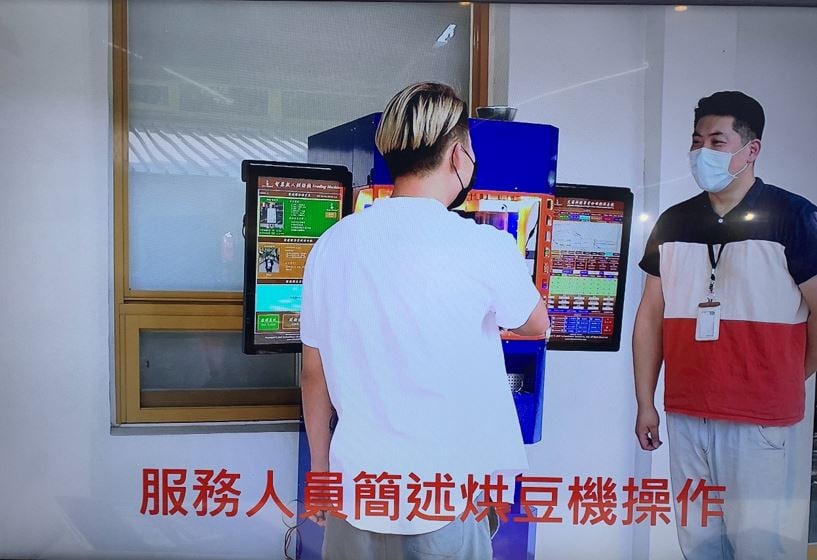
▲ Staff members briefly describe the operation of the autonomous coffee roaster.
'Black Gold' penetrates deeper into coffee shops, science parks, and commercial buildings through AI
This autonomous coffee roaster targets coffee connoisseurs and can be placed in middle to high-end coffee shops to roast more customized coffee beans than those available in bulk stores. Upon completing a batch of coffee beans, it immediately provides them to professional technicians within the coffee shops for grinding and manual brewing. The remaining roasted beans can also be taken home for brewing and enjoyment. It also adds value to coffee shops by better understanding consumer preferences for coffee beans and launching more customer-attracting drink promotions and appropriate inventory management.
In addition to coffee shops, the autonomous coffee roaster can also utilize AI-based people counting analysis to precisely set up near scientific parks and commercial buildings, offering high-quality coffee beans for office brewing to internal employees with high coffee consumption needs. Furthermore, implementing a physical membership system can initiate coffee bean purchase promotions or periodic payment incentives, thus attracting new clients and cultivating existing customer loyalty and retention.
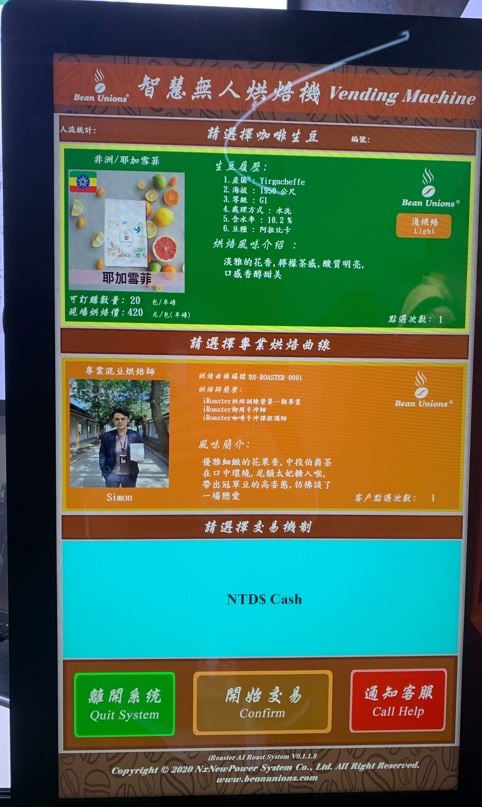
▲ The operation interface of the smart autonomous coffee roaster
「Translated content is generated by ChatGPT and is for reference only. Translation date:2024-05-19」
